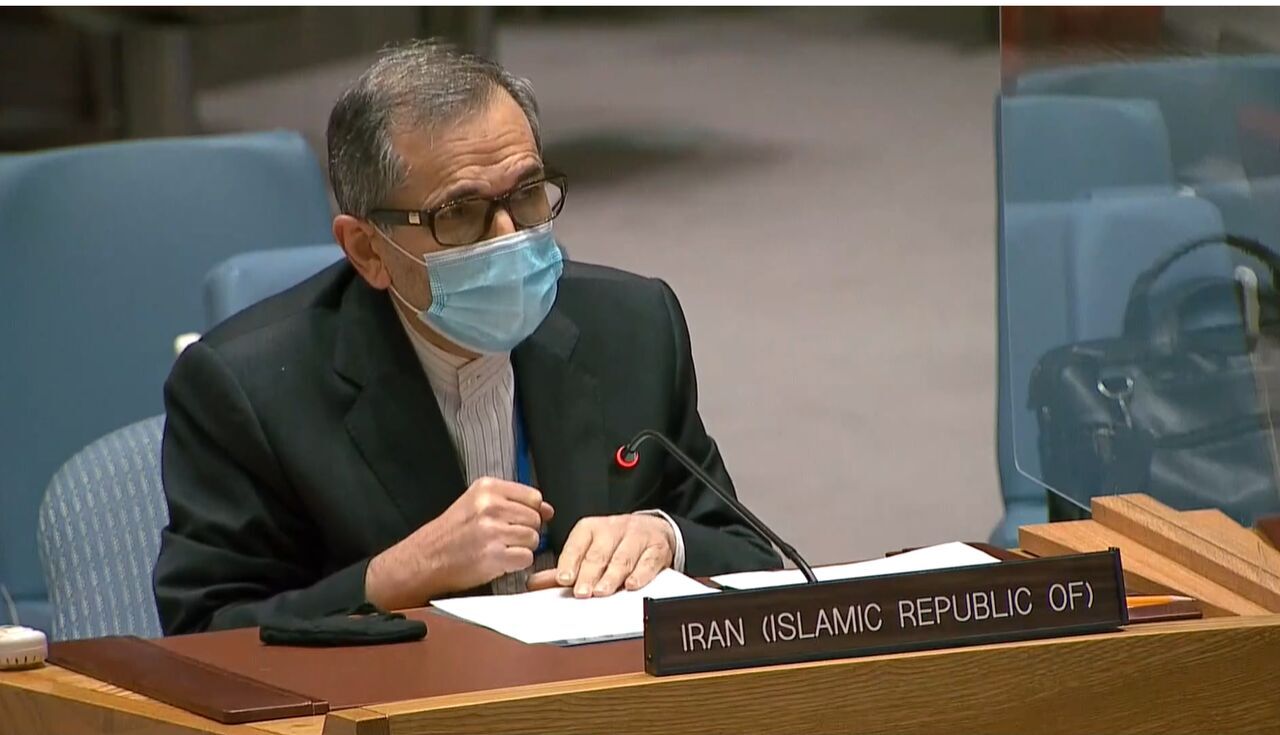During the past four decades, Iran has made it all-out effort to extend support to people in the neighboring country, Takht Ravanchi noted through a statement before the United Nations Security Council session on “Situation in Afghanistan”.
Iran extend such support after official policy of the government “endorsed by our Supreme Leader”, the ambassador noted.
As the ambassador stressed “…, release of Afghanistan’s frozen assets, which is essential for reviving Afghan’s economy and saving people’s lives, should in no way be politicized or conditional.”
He went on to stress that Afghanistan is “facing an unprecedented humanitarian crisis.”
Below is the full text of the envoy’s remarks:
Mr. President,
Afghanistan is facing an unprecedented humanitarian crisis. Since the last meeting of the Security Council in November 2021, the situation is deteriorating day by day, with no sign of progress in sight.
According to the UN reports, more than 24 million people need humanitarian aid and half of the population face acute hunger. Furthermore, over 9 million people are displaced.
If left unchecked, the situation could lead to socio-economic collapse of the country, creating a tragic impoverishment for the entire nation.
The Islamic Republic of Iran expresses its serious concerns over possible devastating consequences of this situation on security and stability of the region including the neighboring countries.
During the last 40 years, Iran has done all in its power to support the Afghan people. This has been the official policy of our government endorsed by our Supreme Leader.
We have dispatched humanitarian convoys, including food, medicine, and medical supplies to Afghanistan.
After the Taliban take over last summer, we never closed our border with Afghanistan and currently normal trade between the two sides is ongoing. During this winter season, it is crucial to continue the provision of humanitarian assistance to Afghanistan.
Since last August, thousands of Afghans enter Iran on a daily basis. The overall situation inside Afghanistan has a direct effect on the decision of the population to stay or leave the country to neighboring countries and beyond.
While the United States’ inhumane sanctions have created tremendous difficulties for our government and people, various services including education, health, medical treatment, vocational training, and employment are being provided to Afghan people living in Iran, with minimal assistance from the international community.
Furthermore, concurrent with the vaccination program of our population, we have also been vaccinating Afghan refugees against COVID-19.
However, due to the imposition of US sanctions, our financial resources are restrained. Obviously, if the international community fails to provide sufficient assistance to the Afghan people living in Iran in a timely manner, we will be unable, on our own, to continue our support to Afghan refugees, a huge number of whom are seeking to go to Europe through Iran.
We, once again, call on the international community and in particular donor countries to live up to their responsibilities and extend new and additional financial resources to Afghanistan’s neighbors to help refugees and displaced persons.
Moreover, the release of Afghanistan’s frozen assets, which is essential for reviving Afghan’s economy and saving people’s lives, should in no way be politicized or conditional.
We support commendable efforts made thus far by UNAMA and other UN agencies in Afghanistan in particular, the recent virtual joint launch by OCHA and UNHCR for Humanitarian and Regional Refugee Responses Plan. This initiative is an important step, which needs to be strengthened with other efforts to address and meet the needs of Afghan’s people and refugee hosting countries.
We take note of the unanimously adopted Security Council resolution 2615 (2021) on exemption of humanitarian assistance and other activities from sanction’s regime. We hope that this resolution could facilitate the timely provision of humanitarian aid to the people in need.
Mr. President,
Along with humanitarian issues, other legitimate concerns, such as the need for the establishment of an inclusive and representative government in Afghanistan should continue to be emphasized by the international community. Furthermore, efforts should be made to combat terrorism, and organized crime in Afghanistan, and equally important, promotion and protection of human rights of all Afghans including women and girls, should be ensured.
1483**9417
Follow us on Twitter @IrnaEnglish



Your Comment